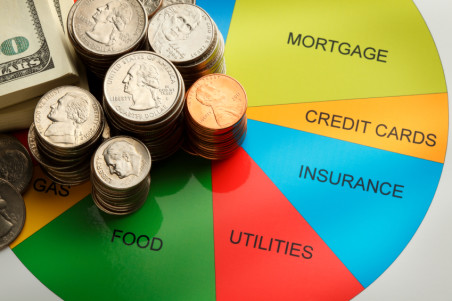Benefits of Budgeting and How It Can Reduce Your Debts

Outsized debts don’t just squeeze a person financially; we feel the weight emotionally and psychologically. It can seem truly hopeless and, for many, it seems easier to look the other way, to minimize their financial struggles.
Many clients tell a familiar story of hiding from their debt, avoiding the topic entirely, and hoping that at some point in the future they will be in a better financial situation – a brighter economy, a more lucrative job, a winning lottery ticket – and they can “deal with it then.”
Unfortunately (and unsurprisingly), this strategy has never worked for anyone, no matter how little or how much debt they are in. On the bright side, there are some simple strategies that any person with a little financial literacy can use to reduce their debt, with the help of trained professional financial counselors and debt settlers.
Taking the First Step
Recognizing that debt is causing distress and that you need to seek help can be a difficult process. Many are embarrassed, ashamed, or in denial due to the social stigma that tends to portray regular people struggling with debt as weak or unstable.
The stereotype of the frivolous, greedy, reckless spender is rarely true to life. In reality, most of us who end up with overwhelming credit card debt are usually just normal people who have been crushed by unexpected expenses like healthcare, divorce, or the sudden loss of their primary source of income.
Debt Relief Options
Even in a world where many use credit cards to make payments on luxury items, and student loan debt is crippling many college graduates, debt is a taboo subject that no one seems keen to discuss in polite company.
Many individuals struggling with debt aren’t aware of the many debt relief options available to them. They may continue to make monthly payments, believing that if they keep at it, eventually they will pay off both principal and interest, and be free of the mountain of debt. This is not always the best strategy.
Strategies for Budgeting
Although budgeting won’t erase the debt, it will ease the related stress and ensure that you and your family transition to a better financial future. Everyone, whether they are in debt or not, benefits from creating and sticking to a budget.
Budgeting doesn’t always mean simply depriving yourself of your morning latte, buying thrift-store clothing, and cutting coupons at the grocery store. There are other ways of increasing income, or at least making do with the income you already have.
Some people sell valuable assets and commit the proceeds to paying down debt. Others take on second jobs or small-scale freelance work and direct all of the extra income toward their eventual financial freedom. The rise of the “sharing economy” is encouraging more and more people to rent out rooms or basement suite in their home. Still others file taxes based on relevant factors such as income level. You could be eligible for assistance with premiums without even being aware of it.
How Budgeting Helps
Small increases in living costs, like rising gas prices and creeping inflation in the price of groceries, add up significantly over time. On the other hand, the expense of your daily cup of coffee adds up over time, too.
Instead of committing to a deferred payment plan or a long-term contract, which can make reducing your debt even more difficult during times of financial hardship, consider small steps you can take right now to make life easier.
If you can find ways to cut back on unnecessary spending or sell some of your assets, you immediately gain extra income without owing additional interest.
Why You Should Have Savings
It might surprise you to learn that having a savings account is one of the best ways to ensure you get out of debt faster. When most people make the decision to get out of debt, their first inclination is not to think about saving money, even though they will soon find that they still need to spend money for ordinary living expenses—without the use of credit cards.
Credit cards are a relatively new phenomenon. Before they were invented, budgeting was the primary method that families and individuals used to save up money for necessary as well as luxury items. Even today, families who organize a budget and stick to it are happier than those who live from paycheck to paycheck.
Debt Settlement and Negotiation
Although budgeting has been proven to be beneficial for those who wish to get out of debt, and families with a savings account are less likely to be stressed in times of financial uncertainty, many people seek help from trusted professionals for their debt reduction goals.
Debt settlers and negotiators work directly with individuals, families, and companies who are feeling overwhelmed by their debt. Their skilled negotiators work with creditors in order to minimize the overall balance owed by the client. If you are interested in learning more about debt settlement and negotiation, reach out to New Era Debt Solutions and read the stories of clients who have successfully settled their debt, saving thousands of dollars and stepping closer to freedom from debt.
